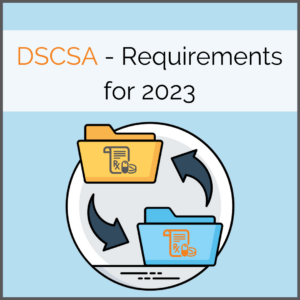
Beginning November 27th, 2023, FDA’s Drug Supply Chain Security Acts (DSCSA) requirements will change. In the future, pharmaceutical products in the USA will be required to be traceable at the lot and package level. Moreover, part of the regulation also states that all parties must participate in data exchange, verification, and tracking of pharmaceuticals. For manufacturers, this may create a tremendous amount of additional work.
The goal of the new DSCSA requirements is to establish an interoperable, electronic system among manufacturers and their trading partners for tracking. It also enables them to easily process product recalls, which subsequently remain salable. However, it remains to be seen whether the majority of manufacturers are ready for this next step.
Transaction Reporting – T3
Part of the current DSCSA requirements includes a transaction report or T3. It consists of the transaction information, transaction history, and transaction statement. Manufacturers and their trading partners will be prohibited from accepting pharmaceutical products if they do not have a transaction report. But what data does the T3 contain?
- Transaction Information (TI): This describes the details of the current transaction. It includes:
- Number of containers
- Dosage and strength of the product
- National drug code (NDC)
- Date of the transaction
- Batch number
- Date of shipment
- Container information
- Transaction History: All transactions of a product, starting with the manufacturer, are stored.
- Transaction Statement (TS): The following information is collected here and confirmed by the submitting party:
- being authorized according to DSCSA.
- having received the product from a trading partner who is also authorized under the DSCSA.
- to have received the transaction information and declaration from the trading partner.
- not knowingly ship a suspicious or illegitimate product.
- have systems in place that meet the verification requirements.
- not providing false transaction information or knowingly altering transaction history.
Transaction information and statement remain relevant. Transaction history will be eliminated with the amendments effective November 27th, 2023. In its place, data exchange around serialization will become more crucial.
Improved Data Exchange
Although there is no specific guidance yet from the FDA on the new DSCSA requirements, the framework has been known since 2017. The most significant are three interwoven components designed to improve drug safety: interoperable data exchange, verification, and tracking.
- Interoperable Data Exchange: according to this framework, authorized trading partners must share transaction information (TI) and statements (TS) electronically in a secure manner. Also, the TI should present a product identification (PI) code at the package level. It includes a product’s national drug code, serial number, lot number, and expiration date.
- Interoperable Verification: The PI must then be verified. It confirms that the supplies received match the associated electronic data.
- Interoperable Tracking: Unit-level serialization becomes mandatory. Individual products should be traceable through the PI in the supply chain.
With these changes, the FDA aims to digitize pharmaceutical product information, make the supply chain more secure, and thus protect patients.
What does it mean?
The final deadline for serialization of the DSCSA was originally scheduled for 2017 but was pushed back a year. Before the actual date, it became apparent that many small and medium-sized businesses were not ready. Three points are particularly critical to avoid another postponement. First, the hardware to scan the codes may need replacement. Previously, it was only necessary to scan bar codes. However, the new ones are 2D codes. They may not be readable by older devices. In that case, compatible hardware with associated software is a requirement. Second, everyone working on the supply chain should know the new DSCSA requirements. Training can help with it, in terms of the requirements and the new hardware.
Serialization Volume
The last important matter and most significant modification revolves around serialization itself, as the volume increases due to the change from lot to package. Problems may arise here in generating the codes or transmitting the data. Moreover, systems must be capable of both challenges to ensure compliance. Experienced serialization providers can deliver the necessary know-how and software to master the transition to the new requirements.